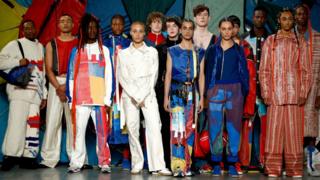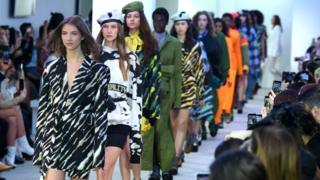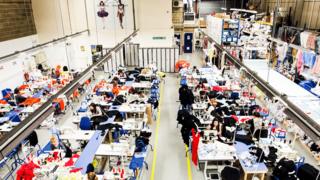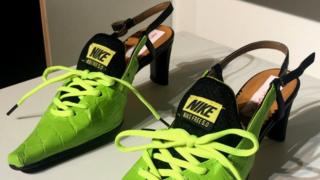 Image copyright BBC/Getty Images
Image copyright BBC/Getty Images September is a huge month in the style calendar, with style weeks occurring in New York, London, Milan and Paris. Each city hosts a series of occasions over 5 days where leading designers flaunt their brand-new collections.
Last week was London’s turn. Believe great deals of “out there” clothing, air kisses on cheeks and greetings of “babe, you look extraordinary!”
But this year, the typical little talk in between programs, and at after-parties, was stressed by conversations about – yep, you thought it – Brexit.
Everyone from designers to garment-makers and designs were eager to understand the effect leaving the European Union will have on their market, which deserves £ 32bn to the UK’s economy.
Despite worries about the possible effect of Brexit , London Fashion Week continues to draw in the finest style skill from around the world with designers from more than 19 nations showcasing their styles.
 Image copyright John Phillips/BFC
Image copyright John Phillips/BFC “The UK’s style scene is inclusive and still open,” states the London College of Fashion’s director of recruitment, Paul Yuille.
The college, which has actually produced popular brand names like Jimmy Choo and J W Anderson, had 3 designers in this year’s occasion.
“We’ve had a boost in applications from European trainees wishing to study style in the UK. It began after the 2016 referendum and this year has actually been no various.”
But his favorable outlook is not shared by everybody in his market.
 Image copyright Venla Shalin/BFC
Image copyright Venla Shalin/BFC Henry Holland is the creator of House of Holland, a designer label used by stars like Kylie Jenner, Lizzo and Little Mix.
His London Fashion Week reveal on Saturday included multi-coloured, leopard print gowns, motto T-shirts and sparkly cosmetics.
When we fulfill him in his east London studio – an open area where Henry’s canine, Little Miss Peggy, strolls totally free – he informs Radio 1 Newsbeat the unpredictability over a no-deal Brexit is making things challenging for his service.
He states with a lot unidentified, it’s difficult to prepare ahead.
 Image copyright Venla Shalin/BFC
Image copyright Venla Shalin/BFC “I’m scared about the future. I believe individuals are mindful and distressed, so when your service is reliant on individuals investing cash on clothing – stress and anxiety and care do not truly work for development.”
On the possibility of abroad trade offers outside the EU with nations like Australia, the United States and Canada, he bewared and acknowledged that any advantages would require time to have result.
“Yes, there are possibilities there, however that’s not something we can do over night.”
‘It’s an overall gamble’
Henry described how currency exchange rate are triggering him problems since of how style business work.
In his market, it’s typical for brand names to forward offer. Basically, they consent to offer clothing at a specific cost a couple of months beforehand.
But, he states it’s difficult to understand how to price things since of the altering worth of the pound .
“The clothing we display at style week will be on sale to the clients in February next year, so I need to position orders on those products, this side of Christmas and this side of Brexit. With changing rates it’s an overall gamble.”
 Image copyright Joe Maher/BFC
Image copyright Joe Maher/BFC Brexit unpredictability isn’t simply affecting high-end designers, however the high street too.
Jenny Holloway runs Fashion Enter, a clothes factory that makes 10,000 pieces each week for brand names consisting of ASOS and Marks and Spencer.
Although they’re based in north London, 85% of their machinists are from eastern Europe.
Jenny states they’re now having a hard time to hire brand-new personnel.
 Image copyright Fashion Enter
Image copyright Fashion Enter “People aren’t knocking on the door like they were previously, asking if they can come and join us.
“It’s been aggravating and disorientating for the labor force since they do not actually comprehend how it will impact them.”
When asked why she does not use more Brits, Jenny states there aren’t presently adequate competent individuals:
“We do not have British garment makers in the numbers we require. There’s been a drop in the number considering that the 70s and 80s”.

Fashion in numbers
- Uses over 890,000 individuals in UK
- Worth £ 32bn to the UK’s economy
- UK shoes, fabric and style exports reached a record high of £ 11.5 bn in 2018
- It is approximated that just 1% of our clothes is recycled into brand-new garments

But Jenny’s identified to bridge the space, she informs Newsbeat she’s established an apprenticeship course that teaches sewing abilities to over-16s. She hopes these students will one day end up being staff members.
“Why not make more clothing in the UK?” she states.
“We have a style academy next door and we’re teaching material abilities to long-lasting and young out of work individuals, so we’re intending to have a circular economy.”
The circular economy is an alternative financial system targeted at minimizing waste and utilizing as couple of resources as possible.
Although she’s fighting with recruitment, Jenny’s positive Brexit might press more clothes factories to open in the UK.

Since the 2016 referendum, she states she’s had a boost in queries from brand names thinking about making items at her factory. She thinks leaving the EU will cause Britain using more competitive rates.
“I’m positive that there will be development within garment production and more garment producers will appear.”
But what about the rate of clothing? Jenny states expenses might go up due to the fact that of taxes on exports and imports when it comes to the high street.
“I believe if you’re importing, and there’s going to be hold-ups and transportation problems, logistics and who understands about tariffs, I can see rates increasing.”
‘Give us an offer’
Now individuals who care for the market are getting included.
The British Fashion Council (BFC) represents designers in addition to preparing London Fashion Week. It’s asking the federal government to ensure an offer that makes it simple for European designs, materials and machinists to come in and out of the UK after Brexit.
In a display room filled with gem-covered helmets, kitten-heel fitness instructors and chain metal sports jackets, Caroline Rush – head of the BFC – informs Newsbeat about the advantages she thinks EU subscription gives the market.
 Image copyright Samir Hussein
Image copyright Samir Hussein “The ease of trading within the EU can’t be ignored, you do not require documentation, we can take a trip quickly, there are VAT plans. There’s one body instead of working out with 27 various areas.”
The federal government does not desire designers to stress and states it will “keep doing whatever it can to support the UK’s fashion business”.
Secretary of State for International Trade Liz Truss states “our creatives, artists and designers are the absolute best on the planet and their success becomes part of what makes Britain terrific”.

Follow Newsbeat on Instagram , Facebook , Twitter and YouTube
Listen to Newsbeat live at 12:45 and 17:45 weekdays – or listen back here .
Read more: https://www.bbc.co.uk/news/newsbeat-49730281


Recent Comments